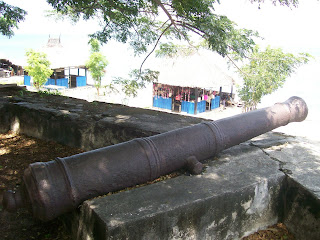
In between volunteering at
Alola and going scuba-diving with
Dive Timor Lorosae, I managed to spend a day 'sighseeing' west of Dili. My friend Hannah and I managed to gently persuade two Portuguese naval officers to take us along with them on their daily trip to Liquisa, where they worked.

Paolo and Augusto are working to reconstruct the hospital at Liquisa, which is about an hour's drive west of Dili. The photo above shows a view from the back of the main hospital building, where the shell of a destroyed building can be seen. On the other hand, the main building has suffered not from violence but from neglect. The photo on the left shows the front of the restored main building of the hospital, with Augusto on the doorstep. The inside has been completely re-tiled, re-wired, re-plastered and re-painted. Paolo and Augusto hope that it will be finished soon, but on the day we arrived, as on other days, all the workers had simply failed to turn up for work. Someone was getting married apparently, or someone had a problem with transport, and they just all took the day off. This was unfortunate for the reconstruction of the Liquisa hospital, but fortunate for Hannah and I, since we now had two ready-made tour guides, with no work to do.

First we headed for the beach. Liquisa formerly had a beach resort, but like so many of Timor Leste's economic activities, this was destroyed during the independence struggle. The beach was clean and pleasant, although Hannah was put off by the black sand. We were assured that this was from the nature of the volcanic soils, not from anything sinister or dirty. It's curious how we associate the colour of the sand with the quality of the beach - in Dili the sand is white, but the water is filthy since raw sewerage pours into it and container ships offload their waste into it. In Liquisa it's black, but clean, yet somehow is less appealing.

We explored Liquisa a bit. This was the scene of much bloodshed during 1999 and the town was used as a set in the film
Balibo in 2008. We visited the now-destroyed Indonesian army officers' mess, which has a shallow lake behind it (shown left). This was a place where allegedly the Indonesians threw Timorese, bound hand and foot, to be eaten by crocodiles. I can't say whether that's true or not, but it is certainly a fairly spooky place.

We then moved on to Maubara, several kilometres further west. Maubara was infamous for being the place where the
Besi Merah Putih militia group was formed. This group of Indonesian-backed Timorese was implicated in much of the death and destruction that occurred in 1999. Maubara had once been a Dutch colony, and they built a fort here, before swapping it with the Portuguese for Flores Island in the 17th century. The fort, and its cannon, still exist. The photo on the right shows one of the cannon pointing out to sea, past the small souvenir stands on the beach.

After snorkelling on a coral reef, then having lunch in the gardens, we were about to explore the fort when the Portuguese Defence Attache showed up at one of the souvenir stands. Since Paolo and Augusto were supposed to be working in Liquisa (despite the fact that no Timorese workmen had shown up that day), our Portuguese friends thought that discretion was the better part of valour, so we high-tailed it out of Maubara and up to the old Portuguese military headquarters on the hill. It felt a bit like wagging school (playing truant) and spotting a teacher in the street, then running away to avoid detection.

The photo has a bit of symbolism for me. The military headquarters, which had once been magnificent, had been restored in 2000, then fallen into disrepair. Now someone has a plan to make it into a hotel, but progress is slow. The photo shows a once-glorious building, now falling apart, with Timorese workmen sitting on the verandah waiting for instructions, or supplies, or plans, or more workmen, or something or other else, to get them going. There was nothing happening. The photo was taken by an expat (me) in the company of other expats (Paolo and Augusto) and we were each struggling with the complexities of assisting the Timorese to re-build Timor-Leste. It's a long, hard struggle and full of disappointments, but in the end, it's got to be worth it.